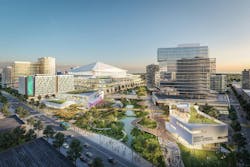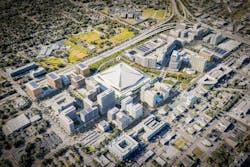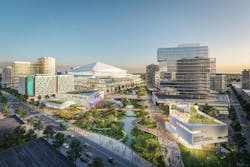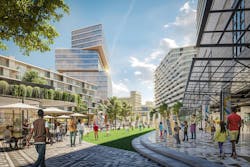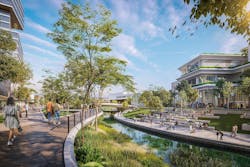Tampa Bay Rays, Hines finalize deal for a stadium-anchored multiuse district in St. Petersburg, Fla.
In the late 1980s, an African-American neighborhood in St. Petersburg, Fla., known as the Historic Gas Plant District, was the victim of displacement by the city to make way for the construction of the Tropicana Field stadium.
Fast forward to September 19 of this year, when the Tampa Bay Rays Major League Baseball team announced that it had reached an agreement with St. Petersburg and Pinellas County on a $6.5 billion, 86-acre mixed-use development that will include a new 30,000-seat ballpark and an array of office, housing, hotel, retail, and restaurant space totaling 8 million sf. (The stadium will be between 850,000 and 950,000 sf.)
The first phase of this project’s 20-year buildout is scheduled to begin construction late next year and be completed by opening day of the 2028 baseball season.
The developer Hines, through its Historic Gas Plant Partnership, is the master developer on this project, which will occur on land currently occupied by Tropicana Field. Hines’ involvement includes a $50 million commitment to equity initiatives with South St. Petersburg that encompass affordable housing, employment and business support, education programs, and minority/women owned business enterprise hiring.
Part of Entertainment District trend
This project can be placed within a larger development trend for entertainment districts that are proliferating around the country. Among the metros where entertainment districts have been proposed, or are currently under construction, are Miami, Gainesville, and Pompano Beach, Fla.; Kansas City and St. Louis, Mo.; Anaheim, Calif.; Norman, Okla.; Clarksville, Tenn., and Springdale, Ark. In many cases, as in St. Petersburg, these districts are positioned as vital pieces of larger urban revitalization and economic growth campaigns.
The St. Petersburg project, when it’s completed, will increase the number affordable housing units built by the Partnership to 1,200, with at least half of those units to be built within the redeveloped district.
The project will include 4,800 market-rate housing units, 600 senior-living units, 1.4 million sf of office and medical space, 750,000 sf of retail, 750 hotel rooms, 100,000 sf of performance/event space that include a 3,000- to 4,000-seat concert hall; 100,000 sf of conference and meeting space, 50,000 sf of cultural and community space that encompasses the Carter G. Woodson African American Museum of Florida; 14 acres of public open space, and 14,000 parking spaces.
The Rays will pay more than half of the $1.3 billion cost to build the new ballpark, and the city and county will contribute an aggregate $600 million.
“Hines … is honored to bring this transformative, city-defining project to life,” said Michael Harrison, Senior Managing Director with Hines, in a prepared statement. “Our goal is to create St. Petersburg’s next great place to live, work, and play.”
The public approval process by the city and county is expected to start this fall.
Tampa Bay Rays, Hines finalize stadium-anchored multiuse district in St. Petersburg, Fla.
